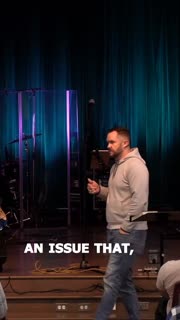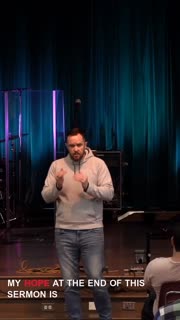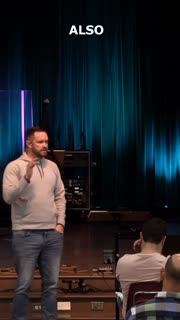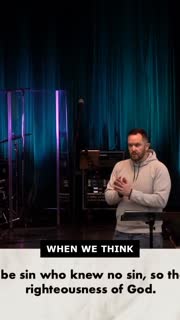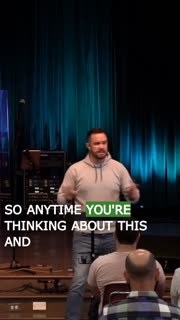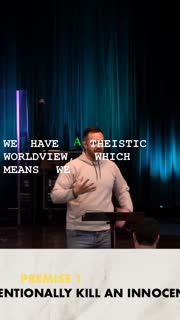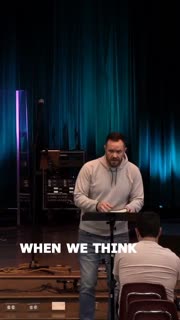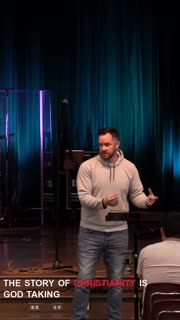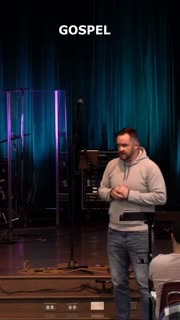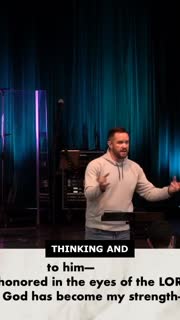Navigating the Complexities of Abortion Through Faith
Devotional
Sermon Summary
Bible Study Guide
Sermon Clips
1. "I believe this is an issue that every single one of us needs to consider though. This should matter on probably a great level. What you believe is what you believe. So before we begin, I will let you know, I started off kind of being handed, I believed kind of what everybody around me believed and what I had been told my whole life. About probably four years ago, I intentionally started to wrestle with this issue just because as it grew and grew, and as Roe versus Wade was overturned, I decided I want to know what I think." [01:54] (36 seconds)
2. "My hope at the end of this sermon is that you will understand why I believe the way I believe. And that you will think about how to think about this. As a Christ follower, you'll have, you may not have a clear, definitive date of, hey, this is when life and humanity begins in the womb, but you'll at least have a clear understanding of this is how a Christian should think about this issue. And that's a very hard thing to do on issues, but I do hope that you can at least understand, I think this is how a Christian should, think about this issue." [04:44] (40 seconds)
3. "I also am very aware that it is highly likely that either somebody in this room or somebody listening to this maybe years later has actually had an abortion or, uh, has been a part of a family that's, that's had to make this decision. Um, and so I want to be clear if you get nothing else out of this is that the story that God gives us is one of redemption. This is not a, um, a, a sermon to make anyone feel guilty, especially if you are following Christ and you're, you have been in a different situation in your past and you're, you have found that shame and the guilt and whatever God has taken that away." [11:40] (39 seconds)
4. "When we think about church, when we think about the story of Christianity of what God is doing, it is one of redeeming brokenness and that story applies to all of us. Our heart is for the down and out. Our heart is for anyone who has been in a situation in their past that has been hard. It is hard for them and we do not want more condemnation on that. The gospel is an exchange. It is exchanging our shame, our past, our sin, our brokenness." [13:05] (29 seconds)
5. "So anytime you're thinking about this and something else gets thrown about you, what about this? What about this? What about this? You've got to go back to this, what is truly at stake and you have to make a decision is it more morally wrong to intentionally kill a human being and is abortion killing an innocent human being? And if so, you'll come to the conclusion abortion is morally wrong. If you disprove any of those, then you would come to the conclusion, okay, then abortion isn't morally wrong. You understand? You've got to keep the main thing, the main thing in an issue like this that gets so muddied." [20:51] (37 seconds)
6. "We have a theistic worldview, which means we believe that God has created us, and not just that he created us, he's bestowed on us a moral absolutes. God has said, this is right and wrong. God has said, you have purpose, you have this. God has given us these things, and they're not up for debate for us. So we believe certain things are right, and certain things are wrong. And we also consider holiness to be just as big a value as our freedom in these things. So we are, if God says it, we are going to submit our way, and we are going to trust in God's way." [22:52] (39 seconds)
7. "When we think about the gospel, we never want to think about this issue on the worst case. Is this a problem to be solved? Instead, we want to make sure we are clear. This is an opportunity for redemption. Lord, as this church wrestles with hard things, as this church tries to wrap our minds around, how does this impact us? How should we vote? How should we think about this? How does this affect the people outside who are going to see this as a hateful perspective? Lord, how do we wrestle with this? I pray that you will give us confidence. To seek you and you alone when we look to issues like this." [48:24] (44 seconds)
8. "The story of Christianity is God taking broken, awful, hard situations and redeeming them, exchanging the heart and making something beautiful. And I just want to point out I know of many families, there's at least four that I know of in our church where this is a direct issue. Mine included. My favorite person, one of my favorite people in the whole world, sorry. His mother had to wrestle with this issue. And she made a choice that has blessed my life beyond anything. And I just want us to take a perspective as Christians to not think about the worst case scenario in a broken world, but as Christians, we think about the redemption opportunities that are all around us on this issue." [47:23] (49 seconds)
9. "I want to start off with the gospel and the gospel is this, is that all of us have a broken past. All of us have a broken past. I'm going to give us just a couple of verses to think about this Romans eight one. There's no condemnation for those that are in Christ. So let's make sure we understand there is no condemnation for those that are in Christ Jesus first Thessalonians five and nine for our God has not destined us for wrath, but to obtain salvation to the Lord Jesus Christ who died for us so that when, while we are awake, awake or asleep, we might live with him." [12:25] (29 seconds)
10. "When we are thinking and wrestling about what does it mean to be a human being, when does a human being begin, when we take the culture and knowing that there is nothing about the culture of ancient Israel or ancient Rome or Christianity that tells us that God might have been for this. Because the silence seems to speak volumes. And when we look at the heart of God and the heart of God seems unanimously to be for the next generation, for children in the womb and out, he speaks to the purpose and formation of them in the womb. I think this has to inform how we think about this issue." [40:52] (39 seconds)
Ask a question about this sermon
2. "My hope at the end of this sermon is that you will understand why I believe the way I believe. And that you will think about how to think about this. As a Christ follower, you'll have, you may not have a clear, definitive date of, hey, this is when life and humanity begins in the womb, but you'll at least have a clear understanding of this is how a Christian should think about this issue. And that's a very hard thing to do on issues, but I do hope that you can at least understand, I think this is how a Christian should, think about this issue." [04:44] (40 seconds)
3. "I also am very aware that it is highly likely that either somebody in this room or somebody listening to this maybe years later has actually had an abortion or, uh, has been a part of a family that's, that's had to make this decision. Um, and so I want to be clear if you get nothing else out of this is that the story that God gives us is one of redemption. This is not a, um, a, a sermon to make anyone feel guilty, especially if you are following Christ and you're, you have been in a different situation in your past and you're, you have found that shame and the guilt and whatever God has taken that away." [11:40] (39 seconds)
4. "When we think about church, when we think about the story of Christianity of what God is doing, it is one of redeeming brokenness and that story applies to all of us. Our heart is for the down and out. Our heart is for anyone who has been in a situation in their past that has been hard. It is hard for them and we do not want more condemnation on that. The gospel is an exchange. It is exchanging our shame, our past, our sin, our brokenness." [13:05] (29 seconds)
5. "So anytime you're thinking about this and something else gets thrown about you, what about this? What about this? What about this? You've got to go back to this, what is truly at stake and you have to make a decision is it more morally wrong to intentionally kill a human being and is abortion killing an innocent human being? And if so, you'll come to the conclusion abortion is morally wrong. If you disprove any of those, then you would come to the conclusion, okay, then abortion isn't morally wrong. You understand? You've got to keep the main thing, the main thing in an issue like this that gets so muddied." [20:51] (37 seconds)
6. "We have a theistic worldview, which means we believe that God has created us, and not just that he created us, he's bestowed on us a moral absolutes. God has said, this is right and wrong. God has said, you have purpose, you have this. God has given us these things, and they're not up for debate for us. So we believe certain things are right, and certain things are wrong. And we also consider holiness to be just as big a value as our freedom in these things. So we are, if God says it, we are going to submit our way, and we are going to trust in God's way." [22:52] (39 seconds)
7. "When we think about the gospel, we never want to think about this issue on the worst case. Is this a problem to be solved? Instead, we want to make sure we are clear. This is an opportunity for redemption. Lord, as this church wrestles with hard things, as this church tries to wrap our minds around, how does this impact us? How should we vote? How should we think about this? How does this affect the people outside who are going to see this as a hateful perspective? Lord, how do we wrestle with this? I pray that you will give us confidence. To seek you and you alone when we look to issues like this." [48:24] (44 seconds)
8. "The story of Christianity is God taking broken, awful, hard situations and redeeming them, exchanging the heart and making something beautiful. And I just want to point out I know of many families, there's at least four that I know of in our church where this is a direct issue. Mine included. My favorite person, one of my favorite people in the whole world, sorry. His mother had to wrestle with this issue. And she made a choice that has blessed my life beyond anything. And I just want us to take a perspective as Christians to not think about the worst case scenario in a broken world, but as Christians, we think about the redemption opportunities that are all around us on this issue." [47:23] (49 seconds)
9. "I want to start off with the gospel and the gospel is this, is that all of us have a broken past. All of us have a broken past. I'm going to give us just a couple of verses to think about this Romans eight one. There's no condemnation for those that are in Christ. So let's make sure we understand there is no condemnation for those that are in Christ Jesus first Thessalonians five and nine for our God has not destined us for wrath, but to obtain salvation to the Lord Jesus Christ who died for us so that when, while we are awake, awake or asleep, we might live with him." [12:25] (29 seconds)
10. "When we are thinking and wrestling about what does it mean to be a human being, when does a human being begin, when we take the culture and knowing that there is nothing about the culture of ancient Israel or ancient Rome or Christianity that tells us that God might have been for this. Because the silence seems to speak volumes. And when we look at the heart of God and the heart of God seems unanimously to be for the next generation, for children in the womb and out, he speaks to the purpose and formation of them in the womb. I think this has to inform how we think about this issue." [40:52] (39 seconds)
